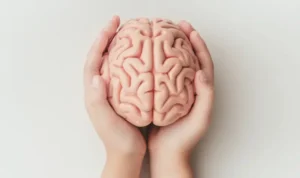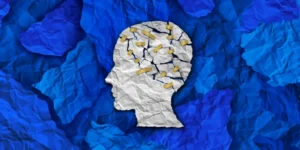When Medication Is Used In Treatment
There are a few different reasons why a doctor may recommend medications to support mental health.
First, a client may need medicine if therapy and lifestyle changes (like diet, sleep, and exercise) alone aren’t sufficiently relieving their symptoms and they’re finding it difficult to cope with everyday life. This may also be an option when mental health conditions are impacting a client’s ability to function at work, school, or home.
In addition, medication can also augment a treatment plan when a client suffers from an ongoing life stressor, such as a chronic illness or financial hardship, that negatively affects their mental health. These can lead to ongoing symptoms of anxiety and depression that may not respond to lifestyle or therapy interventions.
It can take time for clients and doctors to find a medication and dosage that works best with the least number of side effects. It’s important to work closely with a trusted healthcare provider if you’re thinking about adding medications to your mental health treatment regimen.
Therapy.com is user supported. We receive a commission fee from purchases made through BetterHelp links.
Learn More
Main Classes of Mental Health Medications

There are several different types of mental health medications. Your physician will assess your health needs to understand your symptoms and treatment goals before recommending one. Let’s take a look at some of the main classes.
Antidepressants
Antidepressants are therapy drugs that help regulate your mood, behavior, and emotions by increasing certain brain chemicals called neurotransmitters. Most of these medications target serotonin and dopamine, which are known as “feel-good” hormones due to their positive effect on mental wellbeing.
Antidepressants are used to treat depression, but can also be used for anxiety and chronic pain. Common ones include Prozac® (fluoxetine) and Cymbalta® (duloxetine).
Antipsychotics
Antipsychotics decrease or block the activity of some neurotransmitters, including dopamine. An overactivity of these chemicals can lead to psychosis, where a person disconnects from reality and experiences delusions or hallucinations.
Mental health conditions that can cause psychosis include schizophrenia and bipolar disorder. Popular antipsychotics include Adusuve® (loxapine), Abilify® (aripiprazole), and Haldol® (haloperidol).
Anxiolytics
Anxiolytics are anti-anxiety mental health medications used to treat anxiety disorders, phobias, post-traumatic stress disorder (PTSD), and panic disorders. Doctors may also prescribe them for other conditions, including insomnia or seizures.
These medications target neurotransmitters, specifically one called GABA, to reduce brain activity and generate a calming effect. Common anxiolytics include Xanax® (alprazolam), Klonopin® (clonazepam), and Valium® (diazepam).
Mood Stabilizers
Mood stabilizers are therapy drugs that help regulate brain chemistry and are used to treat symptoms of bipolar disorder and related mental health conditions.
They target neurotransmitters to help modulate manic (high) and depressive (low) mood swings that can lead to emotional changes, sleep difficulties, and impulsivity. Some of the most well-known mood stabilizing medications include Eskalith® (lithium), Depakote® (valproate), and Latuda® (lurasidone).
Stimulants
Stimulants are medications that speed up the interaction between your brain and your body. They do this by increasing the levels of neurotransmitters in your brain that help regulate focus and attention.
Doctors may recommend them for people who suffer from mental health conditions that cause attention issues or energy loss, such as attention-deficit/hyperactivity disorder (ADHD) or narcolepsy. Common stimulants include Adderall® (a type of amphetamine) and Ritalin® (a type of methylphenidate).
Sedative-Hypnotics
Sedative-hypnotic medications are designed to slow down the activity of your central nervous system (CNS). In high doses, they can lead to unconsciousness. Doctors may prescribe them to help alleviate symptoms of acute anxiety, panic disorders, or sleep disorders.
They can also be used to calm the physical effects of alcohol withdrawal or even muscle spasms. Popular sedative-hypnotics include Ambien® (zolpidem), Lunesta® (eszopiclone), and Librium® (chlordiazepoxide).
Beta Blockers
Beta blockers are designed to block the way that certain hormones, including adrenaline, affect your heart and blood vessels. While they’re most commonly used to treat cardiovascular conditions like heart failure and high blood pressure, they also have their place as mental health medications.
Doctors may prescribe them to help manage symptoms of anxiety, as well as clinical depression. Common ones include Lopressor® (metoprolol), Tenormin® (atenolol), and Cardicor® (bisoprolol).
Therapy.com is user supported. We receive a commission fee from purchases made through BetterHelp links.
Learn More
Zoloft (sertraline)
Zoloft is a type of antidepressant known as a serotonin reuptake inhibitor (SSRI). It’s primarily used to treat depression, but can also be prescribed off-label to alleviate other conditions like anxiety, obsessive-compulsive disorder (OCD), PTSD, and eating disorders.
SSRI medications prevent serotonin from being reabsorbed by nerve cells after relaying a message, which means higher levels are available in the brain.

Anyone who suffers from depression or anxiety may consider taking Zoloft. However, there are a few health factors that could prevent it from being a good fit. Specifically, it’s not usually recommended for individuals who have bipolar disorder or mania, or anyone with liver problems.
This mental health medication can take up to eight weeks to kick in and start delivering noticeable results. Some side effects that may occur include nausea, diarrhea, and sleep disturbances.
Prozac (fluoxetine)
Prozac is another type of SSRI antidepressant used to treat depression. Off-label, it can also be used to relieve symptoms of other conditions, including OCD, panic disorder, and bulimia. If you suffer from any of these conditions, Prozac may help you manage your mood and emotions by increasing the levels of serotonin in your brain.
It’s important to talk to your physician about adding Prozac to your treatment plan, because this medication isn’t for everyone. Individuals with heart problems, diabetes, or epilepsy may experience adverse reactions to fluoxetine. Some of the most common side effects of Prozac include nervousness, insomnia, and nausea, which should go away after a few weeks.
Lexapro (escitalopram)
Lexapro is an antidepressant medication that also belongs to the SSRI group. It helps regulate your mood and reduce symptoms of depression and generalized anxiety disorder by boosting the amount of serotonin in your brain.
Physicians may also prescribe it off-label to help treat panic disorder, OCD, and PTSD. It’s also used to treat premenstrual dysphoric disorder, a severe form of PMS characterized by severe mood swings, irritability, and depression, and vasomotor symptoms (like hot flashes) associated with menopause.
Anyone who has epilepsy or an irregular heartbeat should avoid taking Lexapro, as this medication could negatively affect those conditions. You may experience nausea, drowsiness, or decreased sex drive when you first start taking this medicine.
Therapy.com is user supported. We receive a commission fee from purchases made through BetterHelp links.
Learn More
Xanax (alprazolam)
Xanax belongs to a group of anxiolytics called benzodiazepines. This medication helps relax your nervous system by enhancing the activity of your GABA neurotransmitter, which has calming effects.
It’s most commonly used to help treat anxiety and panic disorders. Off-label, it can be prescribed to help treat some symptoms of depression, as well as insomnia and premenstrual syndrome.
If your anxiety has become acute enough to impact your quality of life, your doctor may recommend Xanax to help you get those symptoms under control. People with liver or kidney disease should speak to their doctor before starting this medication, and older adults are more likely to experience adverse reactions.
The most common side effects of Xanax include drowsiness, dizziness, and difficulty concentrating.
Ativan (lorazepam)
Ativan is another kind of benzodiazepine available under the anxiolytic class of medications. It’s used to treat anxiety disorders and can also relieve feelings of anxiety related to depression. Off-label, doctors also prescribe it to help treat painful muscle spasms or prevent emergency, life-threatening seizures.
This drug helps regulate your central nervous system, lowers nerve activity, and promotes feelings of relaxation. Like other medications in this class, it does so by activating your GABA neurotransmitter. Your treatment plan may include this medication if you suffer from anxiety or have insomnia caused by worry or situational stress.
Anyone who has difficulty breathing or has a pre-existing liver or kidney problem should not take Ativan. It can also have adverse effects in people with sleep apnea. Common side effects include clumsiness, drowsiness, and muscle weakness.
Wellbutrin (bupropion)
Wellbutrin is a type of antidepressant classified as a norepinephrine and dopamine reuptake inhibitor (NDRI). These mental health medications specifically increase those two neurotransmitters in your brain, which can help improve your mood, attention, and energy levels.
It’s used to treat major depressive disorder and seasonal affective disorder. It can also help people quit smoking because higher levels of dopamine curb nicotine cravings and other withdrawal symptoms.
While Wellbutrin can help alleviate symptoms of depression, it’s not typically recommended for individuals who have a seizure disorder or currently suffer from an eating disorder, such as bulimia or anorexia. Side effects can include anxiety and excitement as well as dizziness, headache, and nausea.
Seroquel (quetiapine)
Seroquel is an antipsychotic medication that can help treat schizophrenia and bipolar disorder. It works by regulating the levels of serotonin and dopamine in the brain, which balances your behaviors, thoughts, and emotions.
Stabilizing dopamine levels helps prevent hallucinations and delusions, while serotonin helps regulate mood. Off-label, Seroquel can also be used to treat other conditions, including generalized anxiety disorder, insomnia, and PTSD.
If you have manic and depressive episodes linked to bipolar disorder or suffer from schizophrenia, this mental health medication can be a helpful tool in your recovery. Let your physician know if you have heart problems or dementia-related psychosis. Notable side effects include difficulty focusing and speaking, irritability, and weakness.
Abilify (aripiprazole)
Abilify is another kind of antipsychotic drug that balances serotonin and dopamine levels in the brain. In addition to schizophrenia and bipolar disorder, doctors may prescribe this medication to help treat symptoms of depression. It’s also useful in controlling the tics associated with Tourette syndrome, and the aggression that can accompany autism spectrum disorder.
While it’s not commonly prescribed for anxiety, doctors may use it off-label to manage acute symptoms that don’t respond to conventional treatment. It can also help treat other mental health conditions, including borderline personality disorder.
Anyone with heart problems, low/high blood pressure, or diabetes should check with their doctor before starting this medication. Common side effects include irritability, insomnia,and indigestion.
Adderall (amphetamine/dextroamphetamine)
Adderall is a stimulant medication that increases the levels of dopamine, serotonin, and norepinephrine in the brain. This helps it gently transition out of a state of overstimulation and makes it easier for individuals to focus and control their impulses.
The two conditions it’s conventionally designed to treat include attention-deficit/hyperactivity disorder (ADHD) and narcolepsy. Off-label, doctors may recommend it as part of a treatment plan for anxiety or depression.
It’s not usually recommended for people who have a history of misusing drugs or heart problems, as well as anyone who’s recently taken any kind of antidepressant medication classified as a monoamine oxidase inhibitor (MAOI).
While taking Adderall, you may experience restlessness or difficulty sleeping. Some people report more serious complications including hallucinations and paranoia.
Vyvanse (lisdexamfetamine)
Vyvanse is another stimulant medication that affects your central nervous system. It adjusts chemical levels in your brain, specifically targeting the nerves that lead to hyperactive behavior and impulsivity.
This drug can help boost your energy levels and give you a short-term feeling of euphoria. It can also help with focus and attention, which is why doctors can prescribe it to adults and children as young as six who have attention deficit hyperactivity disorder (ADHD).
Off-label, it can help reduce the symptoms of other related conditions, including narcolepsy, daytime sleepiness, treatment-resistant depression, and even weight loss.
Let your doctor know if you have an existing cardiovascular condition, kidney problems, or high blood pressure before adding Vyvanse to your treatment plan. Side effects can include dry mouth, appetite loss, insomnia, and restlessness.
Therapy.com is user supported. We receive a commission fee from purchases made through BetterHelp links.
Learn More
Other Considerations

Search by Condition
Choosing the right medication starts with understanding your mental health condition and receiving an accurate diagnosis. This is key to optimizing treatment efficiency, minimizing any side effects, and ensuring your overall health and well-being.
Your physician can help you find a medicine that’s specifically designed to treat the symptoms you’re experiencing so you can begin feeling better as soon as possible. They can also help you fine-tune your dosage amount and timing to make sure you’re taking an appropriate amount of the medication to suit your needs.
Search by Type of Therapy
Medication can be an important and integral part of your mental health treatment plan and help you manage the symptoms of your condition.
However, it’s most effective when combined with another type of therapy that allows you to explore and address the psychological aspects of your condition and develop healthy coping skills. Certain therapeutic approaches may incorporate medication differently, so it’s important to choose the right one for you.
Search by Specialty Program
Some therapists offer specialty treatment programs to address the needs of certain client groups. For instance, individuals suffering from trauma, physical disabilities, or co-occurring mental illnesses and substance use disorders may prefer a tailored approach to treatment that takes their unique perspectives and life experiences into account.
You can also find specialized tracks for members of different populations, such as clients in the BIPOC or LGBTQ+ community, or clients who prefer faith-based options. Researching these options can help you understand what they entail and how medication fits into their treatment approach.
Find a Psychiatrist
Seeking professional help to support your mental health is a major step, and we’re here to take it with you. Psychiatrists are licensed medical doctors (MDs) who specialize in mental health, and connecting with the right one is an important first part of your journey.
In addition to performing evaluations, developing treatment plans, and conducting psychotherapy, psychiatrists also have the authority to prescribe medication to help you manage your symptoms.
Therapy.com’s online search tools can help you find a therapist in your local area who understands your needs and can help you reach your goals. Get started today to find the health and healing you deserve.
Therapy.com is user supported. We receive a commission fee from purchases made through BetterHelp links.
Learn More




